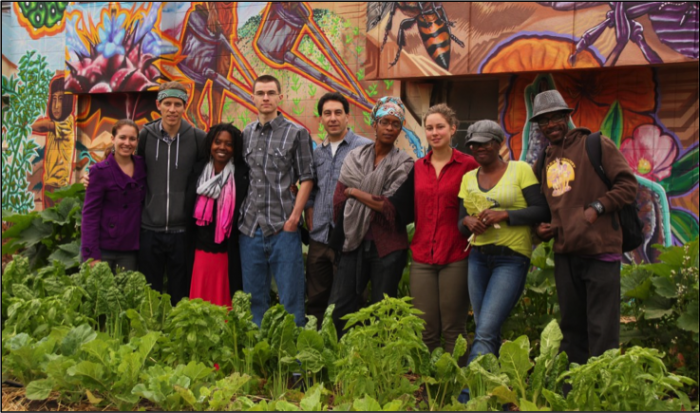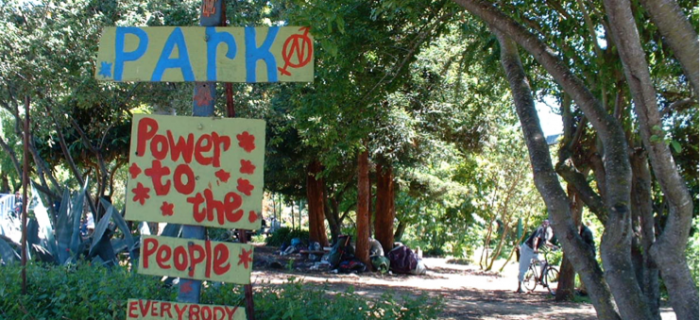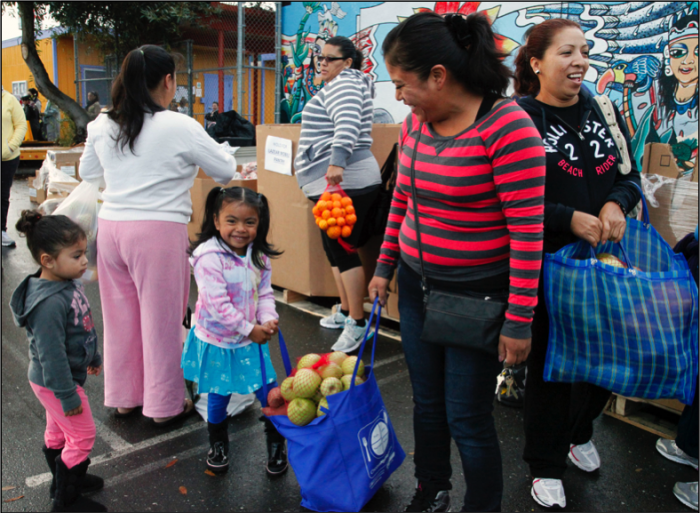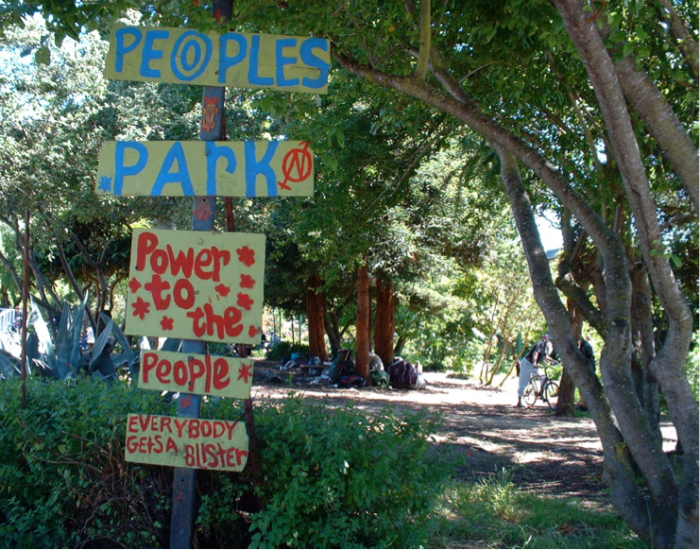How to Work Together: Food Justice in Our Community
By Katie Mott
Last month at the La Peña Cultural Center, the audience heard panelists Shanti Prasad, Lydia Gans, and Brahm Ahmadi dialogue on the future of the food justice movement in the Bay Area.
Shanti Prasad goes above and beyond her role as Community Mobilization Coordinator for the Alameda County Community Food Bank by doing grassroots organizing and online advocacy for state and federal campaigns in partnership with state and national coalitions. She works with those who are hungry to advocate for change and build a sense of camaraderie within food bank community. Last year, 29 million pounds of food were distributed throughout Alameda County. While Prasad is proud of the Food Bank’s achievements, she also recognizes that having excess amounts of leftover food is a systemic problem. Prasad acknowledged that distributing food isn’t what is going to end hunger.We need to focus on the systemic, root causes.
Lydia Gans is a long time activist working with Food Not Bombs, a national organization providing free vegetarian and vegan meals to hungry, at-risk populations. They support nonviolence, consensus-building and vegetarianism, and are not affiliated with any one specific organization. “Our basic premise is food is a human right, not a commodity,” said Gans. Food Not Bombs involves the community by encouraging those receiving meals to help cook meals as well. Food is donated from markets all over the Bay Area and churches and other facilities often supply kitchen space for cooking meals at no charge. Yet Gans also witnesses the overabundance of food, commenting, “There’s something wrong with the system when there’s too much food around and still hungry people.”
Brahm Ahmadi is the definition of unconventional – he created his own spot in the food movement, as well as a whole movement-based business. Ahmadi put his complex ideas pretty simply: People need food and will go to grocery stores to get food no matter what. For those having to take public transportation, up to a third of their food budget will be spent solely on travel costs. Once they purchase food, the money goes straight to the corporate grocery store of choice and out of the community where they live. In West Oakland specifically, 75% of the money spent at grocery stores does not go on to support the community in any capacity. Ahmadi co-founded People’s Grocery, a nonprofit organization in West Oakland that aims to transform inner city food systems through projects in food enterprise, urban agriculture, and nutrition education. “Many underserved neighborhoods are not just underserved in food, but across an entire economic spectrum of needs,” said Ahmadi. His next project is the for-profit People’s Community Market. The Market will be more than just another place to buy food – it will educate and engage communities socially, culturally and politically while providing and producing local foods that benefit the West Oakland community.

People’s Grocery reaches beyond the shelves of a typical grocery store and into the community – Here is a mural and garden created on 7th Street in Oakland.
Stay in the loop with Food First!
Get our independent analysis, research, and other publications you care about to your inbox for free!
Sign up today!The three panelists work in very different parts of the food movement, but they have more in common than you’d think. Each organization faces challenges in building capacity and moving forward. Prasad finds that many people do not feel skilled or educated enough to participate in civic engagement events. Often times, people are hesitant and don’t partake in events because they don’t think they know anything about activism. “What brings people to come to that [event] and what keeps people coming back is that they didn’t know they could just go to the [state] capital building,” said Prasad, referring to the time she brought around 100 people from Alameda County to the capital to show legislators in person what the faces of poverty look like. Whether it be lobbying on “Hunger Action Day” in May, or sitting outside the Alameda City Council until the Food Bank was given an adequate space, Prasad has encouraged people to get involved in the larger food movement. The Speak Up Project (‘SUP!), Prasad’s newest effort, consists of six workshops beginning in October. The workshops will teach people how to advocate and instill the confidence to succeed as leaders in the food movement. These workshops are open to everyone and require no experience.
Gans and Food Not Bombs are not newcomers when it comes to adversity. Just in the Bay Area, Food Not Bombs has been arrested over 700 times since 1992 for sharing food in protest of war and poverty. Law enforcement has attempted to shut down them down all over the United States. Still, Food Not Bombs sticks to their nonviolent approach. The organization relies on donated food, free places to cook, and people who love what they’re doing to support them all along the way. While their trucks sometimes need a few repairs, Food Not Bombs has created workable delivery system for a cause they’re passionate about.
For Ahmadi, building a movement-based business has faced endless barriers, including raising enough capital in the face of inflated property prices, as well as creating a strong foundation in the community. “Traditional [financing] sources are not interested in banking a grocery store or a community that they perceive in a very negative way…Harder than raising money is building a sustained movement to put a project like this forward,” said Ahmadi, referencing the upcoming People’s Community Market. Ahmadi believes that a lot of these issues come from the lack of meaningful support from Oakland city leaders. Without people pressure to create political will, not much can be accomplished. Not to mention, the Bay Area’s housing market is out of control. “If we had a bigger movement that was very vocal and angry, I think all of those barriers could be moved much more easily,” said Ahmadi.
“I don’t think we know how to work together.”
– Brahm Ahmadi
Host Eric Holt-Giménez changed the pace of the conversation by raising the question of how all three of these efforts could come together and coordinate so that everybody is able to access healthy food. Ahmadi once again hit the nail on the head. “I don’t think we know how to work together,” said Ahmadi. He went on to explain how building a sustained, comprehensive movement is hard when it’s typically on the shoulders of the organizations already working so hard on the ground to. With time, effort, and funding spread very thin across the entire Bay Area, it’s incredibly difficult to then try to come together to share ideas. Ahmadi mentioned the need for an entirely separate sector that funds charity work and gets a portion of the taxpayer’s money to sustain these efforts. “We predominantly rely on nonprofits to build movements and it doesn’t seem to work,” said Ahmadi. There’s a demand for a whole new form of organization in the food movement to see how people can work together. In the past, the Community Food Security Coalition had been responsible for ensuring continuation of food assistance projects, finding funding for community food projects from the USDA, and impacting legislation in Washington. Unfortunately, the Community Food Security Coalition disbanded in 2012 and since then funders have lost the political will to reconstruct the coalition.
This leads us back to where we started – working together locally to build the human and social capacity to create a collective, national movement. Prasad mentioned the need for the Bay Area to work collectively as a region, rather than in separate cities. A new coalition, Rise Together, was founded a year after the fall of the Community Food Security Coalition and already has over 160 partners throughout the Bay Area. Coalitions such as these have the tools needed to establish rapport amongst organizations. We need to take the next step in figuring out how to bolster relationships like these within our own communities to foster new ideas and expand the food movement for a healthy, just and sustainable food system.
More information:
SUP! The Speak Up Project: www.accfb.org/advocacy
People’s Grocery & People’s Community Market: www.peoplesgrocery.org
East Bay Food Not Bombs: www.ebfnb.org




 Help Food First to continue growing an informed, transformative, and flourishing food movement.
Help Food First to continue growing an informed, transformative, and flourishing food movement.




